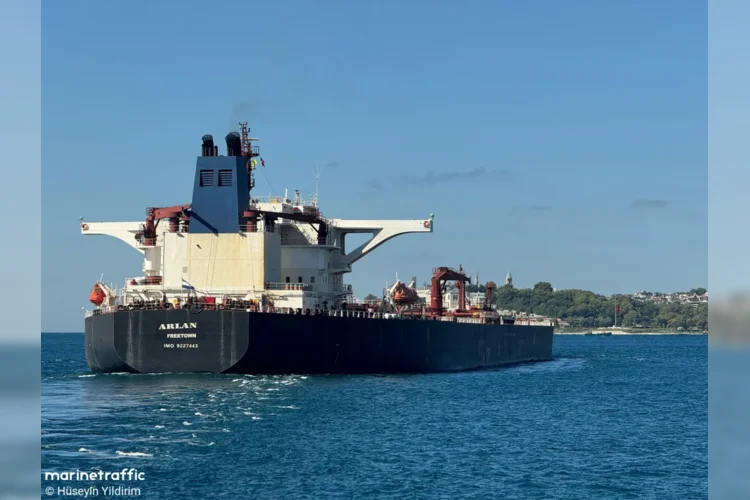ARLAN
IMO 9227443
Updated: 04.08.2025

False data used by the vessel
Vessel name
Flag  Sierra Leone
Sierra Leone
MMSI
667002314
Call sign
9LS2017
Vessel name
ARLAN
Category
Transportation of fossil fuels
IMO
9227443
Flag (Current)
unknown
MMSI
Call sign
Vessel Type
Crude Oil Tanker
Length (m)
274
Gross tonnage
84598
DWT
164262
P&I Club
Sanctions
UK  , EU
, EU  , Switzerland
, Switzerland  , Canada
, Canada 
Sanctions lifted
The person in connection with whom
sanctions have been applied
sanctions have been applied
False data used by the vessel
Vessel name
Flag  Sierra Leone
Sierra Leone
MMSI
667002314
Call sign
9LS2017
Provide additional information
Captains

MURATOV Andrey
Justification
Vessel information
The tanker is involved in violation of the G7 and EU oil embargo on the export of russian crude oil to the EU, and the export of russian oil to third countries. The vessel took russian crude oil from the russian port of Ust-Luga in the Baltic Sea in September 2024 and delivered it to a transshipment point south of Lacon Bay, west of the island of Kithira.
According to United Against Nuclear Iran, the vessel is suspected of transporting Iranian oil. According to an internal analysis prepared by the Scottish Coastguard satellite services, the tanker was involved in a spill of russian oil in the sea about 100 km off the Scottish coastline. At the time, the vessel was carrying 1 million barrels of sanctioned oil from russia on its way to a refinery in India.
The shadow fleet, transporting huge volumes of crude oil through heavily trafficked routes through narrow straits close to the coastline, without proper P&I insurance, with the automatic identification system turned off, threatens an environmental disaster with significant economic costs to be borne by the affected coastal countries and/or the international community.
The shadow fleet continues to provide multibillion-dollar revenues for the russian federation bypassing sanctions, disguising its activities under the flags of third countries, using complex schemes to conceal owners, and poses significant threats to environmental safety with significant economic costs for coastal countries and/or the international community due to the outdated and inadequate insurance of shadow fleet tankers.
On April 11, 2025, Ukraine imposed sanctions on the master of vessel IMO 9227443.
On May 09, 2025, the United Kingdom imposed sanctions on the tanker as part of the restrictions on the shadow fleet of the russian federation, including for engaging in activities aimed at destabilizing Ukraine, undermining/threatening the territorial integrity, sovereignty or independence of Ukraine or benefiting from or supporting the government of russia, and participating in the transportation of crude oil/petroleum products of russian origin, in particular, from russia to a third country.
On May 20, 2025, the EU imposed sanctions, which will enter into force on May 21, 2025, on the tanker for the transportation of crude oil/petroleum products originating in or exported from russia, using irregular high-risk shipping practices as specified in the International Maritime Organization General Assembly Resolution A.1192(33).
On June 03, 2025, the sanctions imposed by Switzerland on the vessel came into force.
In June 2025, Canada imposed sanctions on the vessel.
According to the database of the Global Integrated Shipping Information System of the International Maritime Organization (IMO's GISIS), as of July 30, 2025, the vessel's registered name is ARLAN, and the flag is unknown. At the same time, the vessel sails under the flag of Sierra Leone.
According to United Against Nuclear Iran, the vessel is suspected of transporting Iranian oil. According to an internal analysis prepared by the Scottish Coastguard satellite services, the tanker was involved in a spill of russian oil in the sea about 100 km off the Scottish coastline. At the time, the vessel was carrying 1 million barrels of sanctioned oil from russia on its way to a refinery in India.
The shadow fleet, transporting huge volumes of crude oil through heavily trafficked routes through narrow straits close to the coastline, without proper P&I insurance, with the automatic identification system turned off, threatens an environmental disaster with significant economic costs to be borne by the affected coastal countries and/or the international community.
The shadow fleet continues to provide multibillion-dollar revenues for the russian federation bypassing sanctions, disguising its activities under the flags of third countries, using complex schemes to conceal owners, and poses significant threats to environmental safety with significant economic costs for coastal countries and/or the international community due to the outdated and inadequate insurance of shadow fleet tankers.
On April 11, 2025, Ukraine imposed sanctions on the master of vessel IMO 9227443.
On May 09, 2025, the United Kingdom imposed sanctions on the tanker as part of the restrictions on the shadow fleet of the russian federation, including for engaging in activities aimed at destabilizing Ukraine, undermining/threatening the territorial integrity, sovereignty or independence of Ukraine or benefiting from or supporting the government of russia, and participating in the transportation of crude oil/petroleum products of russian origin, in particular, from russia to a third country.
On May 20, 2025, the EU imposed sanctions, which will enter into force on May 21, 2025, on the tanker for the transportation of crude oil/petroleum products originating in or exported from russia, using irregular high-risk shipping practices as specified in the International Maritime Organization General Assembly Resolution A.1192(33).
On June 03, 2025, the sanctions imposed by Switzerland on the vessel came into force.
In June 2025, Canada imposed sanctions on the vessel.
According to the database of the Global Integrated Shipping Information System of the International Maritime Organization (IMO's GISIS), as of July 30, 2025, the vessel's registered name is ARLAN, and the flag is unknown. At the same time, the vessel sails under the flag of Sierra Leone.
Cases of AIS shutdown
Yes
Calling at russian ports
Yes
Visited ports
Khor Fakkan (UAE), Lanshan (PRC), Novorossiysk (russia), Qingdao Gang (PRC), Ras Sudr (Egypt), Port Said (Egypt), Evyap Port (Turkey), Marport West (Soyak) Terminal (Turkey), Zeytinburnu (Turkey), Ust-Luga (russia), Jeddah (Saudi Arabia), Belokamenka (russia), Dongjiakou (PRC), Primorsk (russia), Adabiya (Egypt), Vadinar (India), Visakhapatnam (India), Jamnagar- Sikka (India), Aygaz (Turkey), Gangavaram (India), Icdas (Turkey), Akcansa (Turkey), Gelendzhik (russia)
Available additional information
Ship Owner (IMO / Country / Date)
Deamar Voyage Corp (6507541 / Seychelles / 02.07.2024)
Commercial ship manager (IMO / Country / Date)
Deamar Voyage Corp (6507541 / Seychelles / 02.07.2024)
Ship Safety Management Manager (IMO / Country / Date)
Bstls Shipping LLC (6507554 / Azerbaijan / 11.07.2024)
Former ship names
Searacer / Innova
Flags (former)
Build year
2002
Builder (country)
Hyundai Samho Heavy Industries Co. Ltd.
Web Resources
